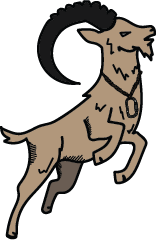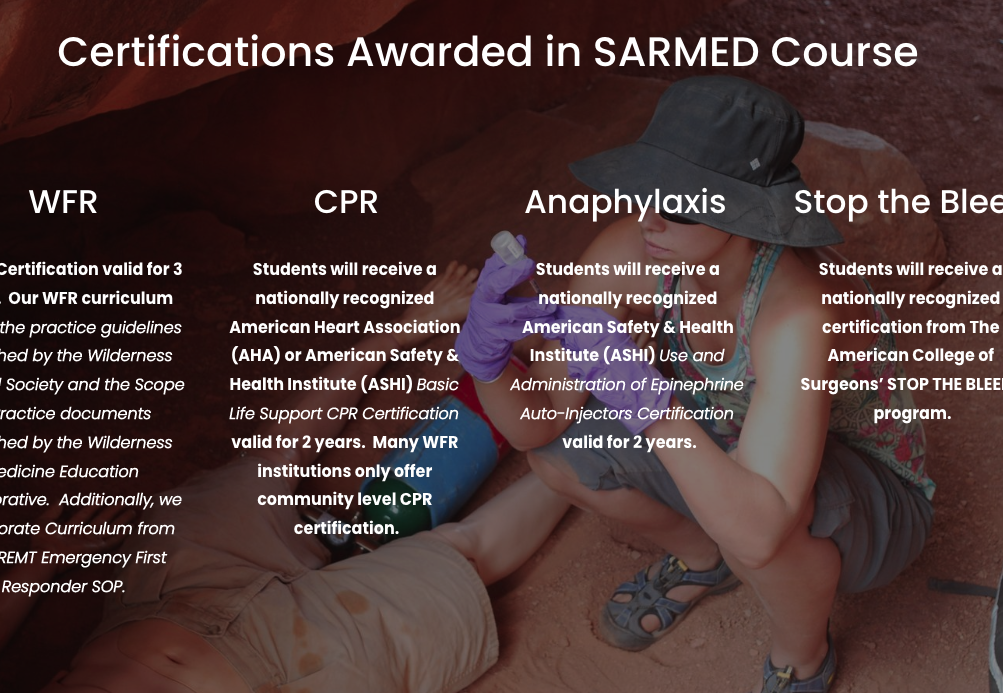The Mountain Institute
Pro SAR : SAR Medical Course
Our mission is to provide SAR practitioners with the skills, strategies, and mindset to competently rescue subjects in wilderness and mountain environments. Go beyond the typical curriculum and skill sets taught in common rescue courses and let us help optimize your team for high-stakes missions. Be the team that thrives and excels when lives are on the line. Let’s train together, so your team won’t have to rise to the occasion, they will default to their level of training. A high-performing SAR team.
- SARMED E-textbook & manual
- Field Guide
- Protocol Consulting
Hybrid SARMED WFR Course
$800/Student
This hybrid course consists of 30 hours of self-paced hybrid work followed by a 5-day field course.
-
A minimum of 6 students is needed to hold the course.
-
The typical class size is 8-12 students.
-
Additional fees may apply for instructor travel & lodging.
Hybrid SARMED WFR Refresher
$375/Student
This hybrid course consists of 8 hours of self-paced hybrid work followed by a 2-day field course.
-
A minimum of 6 students is needed to hold the course.
-
The typical class size is 8-12 students.
-
Additional fees may apply for instructor travel & lodging.
SARMED Daily Itinerary
Field Day 1: Basic life support skills
Course Introduction
Wilderness Medicine Protocols
Wilderness Medical-Legal/Rescuer Professional Liability
Golden Principles of Wilderness Medicine
Patient Assessment Field Scenarios
Crew Resource Management
Communication/Documentation
Rescue Leadership Principles: Getting the Victory
Airway Assessment & Management
Oxygenation & Ventilation Basics
Wilderness Airway Improvisational Techniques
Stop the Bleed Training & Certification
Shock & Bleeding
Internal Bleeding Assessment & Treatment
External Bleeding Assessment and Treatment
Pressure bandage/tourniquet/improvised tourniquet
Wound packing and hemostatic agents
CPR & Wilderness CPR protocols
Pit crew approach/Adult CPR/Pediatric CPR/Neonatal CPR
Field Day 2: The Trauma patient
Orthopedic Injuries
Fracture Assessment & Splinting
Wilderness improvisational splinting
Taping and Wrapping
Wilderness wound care
Prolonged care of wilderness wounds
Wound closure
Preventing & managing infections
Burns
Impaled Objects
Neurological Injuries
TBI and concussion management
Spinal cord injuries and selective spinal criteria
Back-boarding & Patient Packaging
Back boarding 101 & C-Collar, log-roll
Chest/Abdominal/GI Injuries
Prolonged Transport Guidelines
Field Day 3: Medical Emergencies
Overview of Medical Emergencies
Asthma & Anaphylaxis
Cardiac Emergencies (Angina/AMI)
Strokes
Seizure vs Syncope
Diabetes
Toxicology & Combative patients
Acute Abdomen
N/V/D and Travel Medicine
Backcountry Medicines & Technologies
Field Day 4: Environment Emergencies
Heat Emergencies: Heat Exhaustion/Stroke/Hyponatremia
Cold Emergencies: Hypothermia & Frostbite
Altitude Emergencies: AMS/HAPE/HACE
Avalanche Resuscitation Drownings
Lightning Injuries
Snakes, Spiders & Scorpions
Field Day 5: SAR and Wilderness Evacuation
Professional SAR Deployment
Mission Optimization for SAR Deployments
SAR Med kits/24 hour pack/IFAK Med kits
SAR evacuation equipment
Improvisational Wilderness Evacuation
Rope carries, Tarp & backpack carries
Litter and stretcher building workshop
Electives to be decided with SAR Team for the final day:
Helicopter Orientation
Stress Inoculation Training
Basic Technical Evacuations

